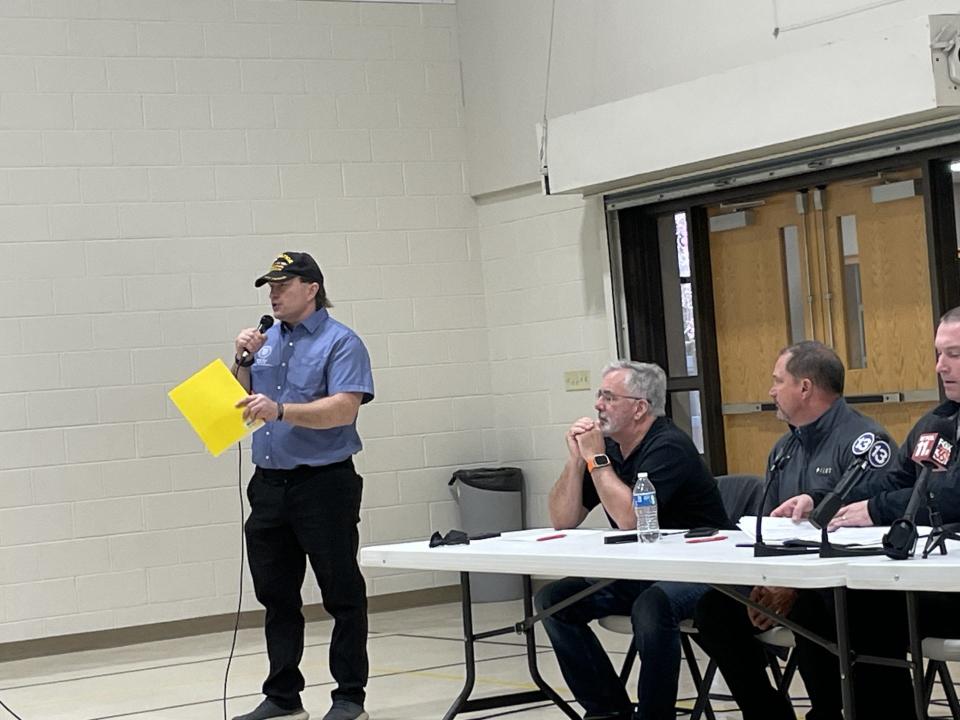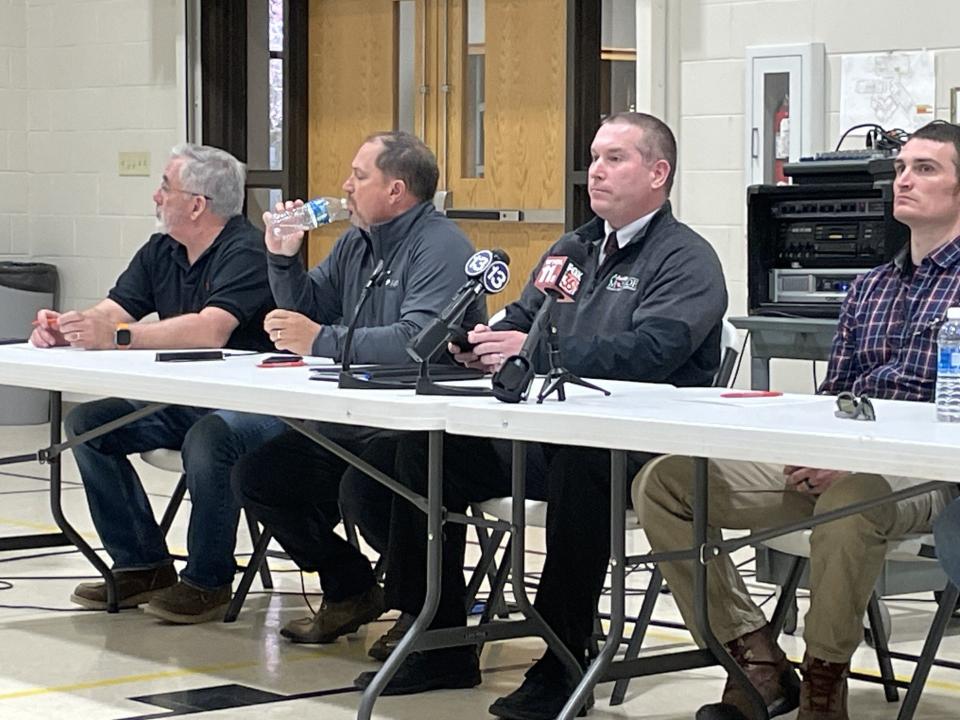EPA, EGLE, Pilot field questions about diesel fuel leak
OTTAWA LAKE — Many Whiteford Township residents showed up Wednesday to learn more about the diesel fuel leak that occurred in late March at the Pilot Travel Center at Exit 5. Rep. William Bruck, R-Erie, hosted two town hall meetings at St. Mark Lutheran Church.
Taking part were representatives from the U.S. Environmental Protection Agency; the Michigan Department of Environment, Great Lakes and Energy (EGLE); Monroe County Health Department; Michigan Department of Health and Human Services; Whiteford Township; the Monroe County Drain Commission; and the Pilot Travel Center.
In March, more than 20,000 gallons of diesel fuel leaked and much of it flowed into Tenmile Creek after a leak occurred at Pilot's location at the intersection of US-23 and US-223. The source of the leak was not discovered for several days. It's unknown how long the fuel leaked into the creek. Brian Kelly from the EPA called the Whiteford incident "a large response" for the EPA. Water was tested in the area, and bottled water and bulk potable water were offered to residents in the affected area. Current plans include further cleanup, replacing Pilot's old fuel equipment and long-term water testing.

Bruck said he frequently goes to the cleanup site and is pleased with the efforts. He said 70 to 80 workers are onsite each day.
“I’ve been to the site at Exit 5 five of the last seven days,” Bruck said. “I’m impressed with the efforts."
Bruck said he has learned that diesel fuel floats on water, while gas mixes with the water. Diesel is much easier to remove from water.
“Had this amount of fuel been gas, this would be a different scenario today," Bruck said.
Representatives on Wednesday spoke and then fielded questions. Afterward, residents could speak one-on-one with the officials and signup for water sampling. Whiteford has about 4,500 residents. Just 120 use municipal water. The rest use wells and septic tank, which require testing, Bruck said.
Kelly from the EPA gave an overview of the situation. He said late on March 21, residents noticed a sheen in Tenmile Creek and reported it.
“We went out to locations and met a person who called. We drove around with them. We spent all day going back upstream at Tenmile Creek," Kelly said.

Soon, there was a big change.
"A lot of diesel was in that outfall of the creek. We deployed out. We starting making phone calls to different gas stations in the area. Pilot helped put soft booms on the outfall and stayed onsite. We called to get the EPA involved," Kelly said.
After investigation, the leak was traced to the Pilot Travel Center. Cleanup has included vacuuming the outfall of the creek, containing contaminated liquid in trucks and placing containment booms in Tenmile Creek and other waters. EPA is overseeing all cleanup.
“Any work onsite or in the creek is approved and overseen by us, every minute of every day," Kelly said. "EPA and EGLE are not going anywhere until all that contaminate is removed."
Work now includes removing vegetation, checking the soil and protecting endangered and sensitive species.
“We're making sure that whatever those are are protected. It may take an extra couple hours to get permits, but we are looking at everything to make sure everything is protected," Kelly said.
Daily cleanup updates are available at Bit.ly/4ayrgOo.
Joey Cupp, environmental manager for Pilot Travel Center, also spoke Wednesday.

“We sincerely apologize for any of the inconvenience this may have caused,” Cupp said. “We’re really trying to get all of that taken care of. We'll do everything it takes to make sure it’s clean and ready to go. We won't stop until the EPA and EGLE let us know it’s back to being safe and taken care of."
Cupp said Pilot also is removing its 25-year old Whiteford Township fuel systems and installing more modern ones that have leak sensors and other protective measures. The diesel systems will be switched first and then the gasoline systems.
“This will ensure that this is very unlikely to happen again," Cupp said.
Chris Westover, environmental health director from the Monroe County Health Department, spoke about water testing.
He said results have been received for the 35 residential wells in close vicinity to the leak.
"Nothing in any of those that are ringing alarms," he said. "The sample results are very promising. There's no indication in any of the sample that there's a biodiesel component."
After the first wave of testing, all Whiteford Township residents could opt to have their well water tested.
“By noon Tuesday, 146 samples had collected. By noon Tuesday, there were 84 appointment," Westover said. "Our goal is to get 300 to 400 samples. We want your information for the testing and your peace of mind."
Some of the questions asked at the noon session:
What’s the integrity of the Pilot tanks? A precision pressure testing of the tank is performed annually by a third-party certified state tester. It’s a pressure test to ensure all is tight and holds the pressure. We got a passing test. For the lines, we do the same; the line is tested for pressure. Monthly inspections are done on top of tanks. All monthly inspection in February showed no issues.
Will there be long-term monitoring of wells? There will be some long-term monitoring based on test results. How long is to be determined.
Aren’t there alarms to alert to changes in pressure? No, the tanks were installed in 1999. There are no alarms underneath. A new system will be installed. Each will have a senor. Those will have alarms. If there’s a breech, the sensor will go off. We’ll know where the problem is.
Will this affect our property value? Audience members were urged to ask a realtor.
What is the tank made of? The tank and lines are fiberglass. The tank did not leak. The leak was on the section of piping leading from the pipe to the pumps. Fuel made its way outside of both sections of the pipe.
Subscribe Now: For all the latest local developments, breaking news and high school sports content.
I heard on the news that 11 wells had containment detected. This could be from other sources. We took biodiesel samples from Pilot’s tank and sent it to the lab. There was no biodiesel from Pilot in any of those 11 wells. The tests test for 63 things. For those 11, there were one or two results that were something beside “non-detected,” but it wasn’t a human health concern.
Which way does the groundwater flow? This area has unique geology, and the water flows in at least four directions.
Wouldn't someone have noticed 20,000 gallons lost? It didn't show up in an alert. We’re looking back at our systems to make sure whatever happened doesn’t happen again.
Was there discharge in Lake Erie? There is no way to know. We put booms in the water. We didn’t seen any heavy oil after March 22. Ohio was alerted. Toledo did checks were Tenmile Creek goes into Sylvania and the Ottawa River. There were no sheens.
I’m in Summerfield Township, which is close to Whiteford. Is my water safe? The leak location was almost central in Whiteford. The immediate and most important concern was Whiteford. We’ve done a couple hundred samples with no indication of biodiesel. We’ll check with Pilot about longer-term testing. If your water tastes, smells or looks funny, contact the Monroe County Health Department.
— Contact reporter Suzanne Nolan Wisler at swisler@monroenews.com.
This article originally appeared on The Monroe News: EPA, EGLE, Pilot field questions about diesel fuel leak

